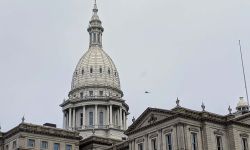Michigan Gov. Whitmer: Unemployment benefits are at risk and GOP is dawdling

LANSING — Democratic Gov. Gretchen Whitmer on Tuesday issued an urgent plea for Michigan's Republican-led Legislature to return to Lansing and codify unemployment insurance benefits she had extended under executive orders upended by the state's highest court.
GOP leaders responded with return dates for this week and next but did not specify their agenda as tensions continued to flare following Friday's Michigan Supreme Court ruling, which deemed unconstitutional a 1945 law Whitmer had used for emergency orders.
House Speaker Chatfield of Levering accused Whitmer of hypocrisy, and the governor called Senate Majority Leader Mike Shirkey of Clarklake an "anti-masker" for opposing a statewide mask mandate.
The Whitmer administration has infuriated Republican lawmakers by issuing new epidemic orders through the public health code to continue a statewide mask mandate, crowd limitations and some regulations for businesses, including rules for indoor bar service.
- Michigan Supreme Court rules Whitmer lacks COVID-19 emergency powers
- Michigan unemployment benefits expanded to 59 weeks for some workers
- Michigan’s unemployed to get $900 more. System glitches remain
But health orders only go so far, and without legislative action "in the next few days," hundreds and thousands of Michiganders who lost jobs amid the COVID-19 pandemic could lose their unemployment benefits, Whitmer said in an afternoon news conference at the state Capitol.
"I'm here in the Capitol today, but the Legislature's not,” she added, jabbing lawmakers who rarely meet in the final weeks of an election season.
“I'm hoping they will cancel their October recess and get back to work."
GOP leaders announced Tuesday evening they plan to come back to Lansing late this week and early next week to act on COVID-related legislation following the court decision, but they did not offer specifics.
“We will do everything we can to make sure the people of Michigan have peace of mind about the state’s response and about their future,” House Speaker Lee Chatfield and Senate Majority Leader Mike Shirkey said in a joint statement Tuesday.
“The exact legislative agenda has yet to be determined, but the Senate and House are working together right now to review the governor’s numerous executive orders and determine which issues require immediate attention.”
Whitmer's comments earlier in the day drew a rebuke from House Speaker Lee Chatfield, R-Levering, who told reporters Monday he was already planning to call legislators back to Lansing early but did not give a clear timeline for when the lower chamber may reconvene.
"We've been in session all during Covid, yet the governor has refused to work with us," Chatfield wrote on Twitter. "Now she's claiming we're not in town while she's working, though yesterday she campaigned all day for House Democrats. The hypocrisy is astounding."
Whitmer on Monday joined state Rep. Sheryl Kennedy for a campaign event in Davison and was expected to join Rep. Brian Elder for events in Bay City later that day. Both Democrats are up for re-election, and the governor stumped for them despite what she referred to on Tuesday as “chaos” created by the conservative majority on the Michigan Supreme Court.
Whitmer’s unemployment order, effectively invalidated by the Friday ruling, had allowed jobless Michiganders to qualify for benefits for up to 26 weeks instead of the traditional 20 weeks. It also expanded a workshare program for partial employment and suspended some filing requirements to make it easier for residents to apply.
Chatfield has not weighed in on the order or whether unemployment benefits are a priority for the lower chamber.
As of last week, nearly 2.3 million Michiganders had qualified for some form of unemployment insurance since March, when COVID-19 first hit Michigan and prompted Whitmer to close businesses she has since allowed to reopen with restrictions.
Senate Majority Leader Mike Shirkey, R-Clarklake, on Saturday told Bridge he thinks unemployment insurance is an area of common ground for Whitmer and GOP lawmakers. But it's not clear if he supports the six-week eligibility expansion Whitmer had granted through executive order, and a spokesperson did not immediately respond to questions.
In striking down Whitmer's emergency powers on Friday, Justice Stephen Markman noted the Michigan Supreme Court's decision "leaves open many avenues for the Governor and Legislature to work together to address this challenge."
But the ruling, at least initially, appears to have hardened partisan lines in Lansing.
Shirkey this weekend made clear the GOP-led Senate would not vote to continue Whitmer’s statewide mask mandate. And when Gordon issued a new mask rule through the public health code instead, the Senate leader accused the Whitmer administration of an end-around.
"Don’t let anyone tell you [Whitmer] should be allowed to ignore our Supreme Court because the Legislature won't work with her," Shirkey wrote Tuesday on Twitter. "There are so many examples proving that wrong."
As evidence, Shirkey pointed to successful August negotiations over a school restart plan and last month’s completion of a $62.8 billion state budget.
And on Tuesday, even as she blasted GOP lawmakers, Whitmer signed a bipartisan bill allowing clerks to begin processing absentee ballots the day before the Nov. 3 election.
"The Legislature has proven time and again that we're ready to do the hard work necessary to reach agreement,” Shirkey wrote. “But her actions this week prove she'd much prefer to govern alone."
Whitmer accused the GOP of sitting on a separate bill that would allow overseas military members to return absentee ballots electronically. The measure passed both chambers last month but was not formally sent to her desk.
Shirkey has shown a “disdain for science” and is an “anti-masker,” the governor claimed. While he opposes a mask mandate, Shirkey has consistently recommended that Michiganders wear face coverings as a protective measure, a message he reiterated Friday after the court ruling.
Michigan Democrats on Tuesday also blasted the GOP-led Legislature for spending roughly $542,000 to fight Whitmer’s emergency orders, a figure released by the House and Senate upon request of the Progress Michigan liberal advocacy group.
The Legislature sued the governor in May, and while the Supreme Court did not rule on their suit, GOP attorneys filed briefs in the case.
“Whitmer has put our health and safety first for the past 7 months,” Michigan Democratic Party Chair Lavora Barnes said in a statement. “We can't say the same about these legislative ‘leaders’ that continue to disregard public health warnings, and put the lives of all of Michiganders at risk while wasting taxpayer dollars."
Gordon on Tuesday issued two additional epidemic orders, one requiring schools to disclose COVID-19 outbreaks, and a second mimicking Whitmer’s latest regulations for nursing homes and other congregate care settings.
Those health orders could also be challenged in court, but they were not part of the case decided Friday by the Michigan Supreme Court. And for now, they carry the weight of law, according to more than a dozen attorneys at the University of Michigan law school.
Whitmer defended the unilateral health department actions Tuesday, saying she is "never going to negotiate when it comes to doing the right thing and protecting people's health.”
While GOP leaders say they are ready to work across the aisle in the wake of the Supreme Court ruling, Shirkey’s comments opposing a statewide mask mandate were not a good way to start those talks, said Senate Minority Leader Jim Ananinch, D-Flint.
“I think the worst thing we can do, even though it’s kind of what he did, is to start saying what we’re not going to do,” Ananich told Bridge. “In negotiations, you sit down and listen to both sides. If we all start off with five things we won’t do, the list will be pretty small.”
See what new members are saying about why they donated to Bridge Michigan:
- “In order for this information to be accurate and unbiased it must be underwritten by its readers, not by special interests.” - Larry S.
- “Not many other media sources report on the topics Bridge does.” - Susan B.
- “Your journalism is outstanding and rare these days.” - Mark S.
If you want to ensure the future of nonpartisan, nonprofit Michigan journalism, please become a member today. You, too, will be asked why you donated and maybe we'll feature your quote next time!




